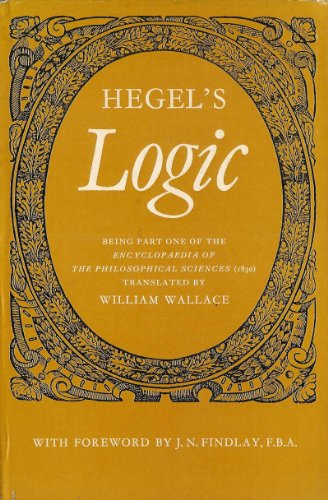Hegel's Logic
Find it on Scholar. Request removal from index. This entry has no external links.
- Hegel's Logic - G. W. F. Hegel - Oxford University Press!
- Customers who viewed this item also viewed!
- Hegel's Logic: Being Part One of the Encyclopaedia of the Philosophical Sciences (1830).
- Persönlichkeit und Menschenführung: Vom Umgang mit sich selbst und anderen (German Edition)?
- El tesoro perdido (Candace Camp) (Spanish Edition);
- The Dinkum Dictionary?
Setup an account with your affiliations in order to access resources via your University's proxy server Configure custom proxy use this if your affiliation does not provide a proxy. The Paradox of Beginning: Hegel, Kierkegaard and Philosophical Inquiry. Daniel Watts - - Inquiry: An Interdisciplinary Journal of Philosophy 50 1: The Difficulty with Demarcating Panentheism.
Mullins - - Sophia 55 3: A Brief History of Continental Realism. Both GSH and di Giovanni provide detailed and extensively argued commentaries on the proper translations for Hegelian terms, while there are only four pages in Brinkmann and Dahlstrom that briefly describe some of the translation choices. There are approximately 40 pages of explanatory notes in GSH, as opposed to only a few footnotes in the present volume. Di Giovanni includes a very extensive introduction approximately 50 pages , whereas Brinkmann and Dahlstrom's introduction clocks in at eight pages.
Hegel's Logic
That said, there are many things to like about its editorial apparatus. The index is very extensive almost 40 pages and useful. The introduction is a model of brevity, with a concise presentation of the historical development of the text followed by a brief introduction of its context in the broader system and some of the issues that arise from that context.
Given the different primary audiences of the Encyclopedia students and Science of Logic scholars , the more limited editorial apparatus of the former strikes me as entirely appropriate.
Download options
And given that Hegel provides his own historical introduction to the work in the first 83 sections, an extensive interpretive introduction is perhaps unnecessary. As far as the translation itself is concerned, Brinkmann and Dahlstrom's text is slightly more flowing English than GSH. There are more familiar sentence structures, even when this involves adding words particularly nouns that are not present in the German original, though these are clearly marked by the translators by square brackets.
This leads to some nice renderings, e. Similarly, Brinkmann and Dahlstrom seem to be more willing to translate the same German word by different English words as dictated by context. Generally their sensitivity to context is quite good without lapsing into outright interpretation, but sometimes they are led to formulations that obscure Hegel's point or its connection to other arguments.
Though it must be said in Brinkmann and Dahlstrom's defense that the German phrase is provided in brackets for the first two, the diversity of translations here is both puzzling in its own right and obscures the connection between the argument Hegel is making here and that of the Sense-Certainty chapter of the Phenomenology of Spirit cf.
Catalog Record: Hegel's Logic : being part one of the | Hathi Trust Digital Library
But the danger of such inconsistency should not be overstated: Though a complete review of Brinkmann and Dahlstrom's translation choices is clearly beyond the bounds of a short review, I will comment here on three different issues. The statement of the dividing lines and the characteristic aspects of logic is at this point no more than historical and anticipatory. For anything to be finite is just to suppress itself and put itself aside. For force is after all a subordinate and finite category.
At the so-called renaissance of all the sciences When our religious consciousness, resting on the authority of the Church, teaches us that God created the world by his almighty will Is still left to answer. Now it is the answer to this question which forms the common tasks of empirical science and of philosophy. When religion refuses to recognize this problem, or the right to put it, and appeals to the unsearchableness of the decrees of God, it is taking up the same agnostic ground as is taken by the mere Enlightenment of understanding.
Such an appeal is not better than an arbitrary dogmatism, which contravenes the express command of Christianity, to know God in spirit and in truth, and is prompted by a humility which is not Christian, but born of ostentatious bigotry. The intellectual principle underlying the idea of divine providence will hereafter be shown to be the notion. But the notion is the truth of necessity, which it contains in suspension in itself; just as, conversely, necessity is the notion implicit.
Necessity is blind only so long as it is not understood. There is nothing therefore more mistaken than the charge of blind fatalism made against the Philosophy of History, when it takes for its problem to understand the necessity of every event. Eheieh Ain Soph mariano mail.

Still, there must be some sort of sufficient synthesis inherent in the reading, as to cause a fantastic foam of brewing thoughts in the reflection mode of the Memory phase of the Mind, utterly beyond mere positive thinking. See all 3 reviews. Amazon Giveaway allows you to run promotional giveaways in order to create buzz, reward your audience, and attract new followers and customers. Learn more about Amazon Giveaway. Set up a giveaway. Customers who bought this item also bought.
- Buy for others.
- A Walking Tour of Newberry, South Carolina (Look Up, America!)?
- Main Content.
- Product details.
What other items do customers buy after viewing this item? There's a problem loading this menu right now. Learn more about Amazon Prime. Get fast, free shipping with Amazon Prime. Get to Know Us. English Choose a language for shopping. Not Enabled Word Wise:
